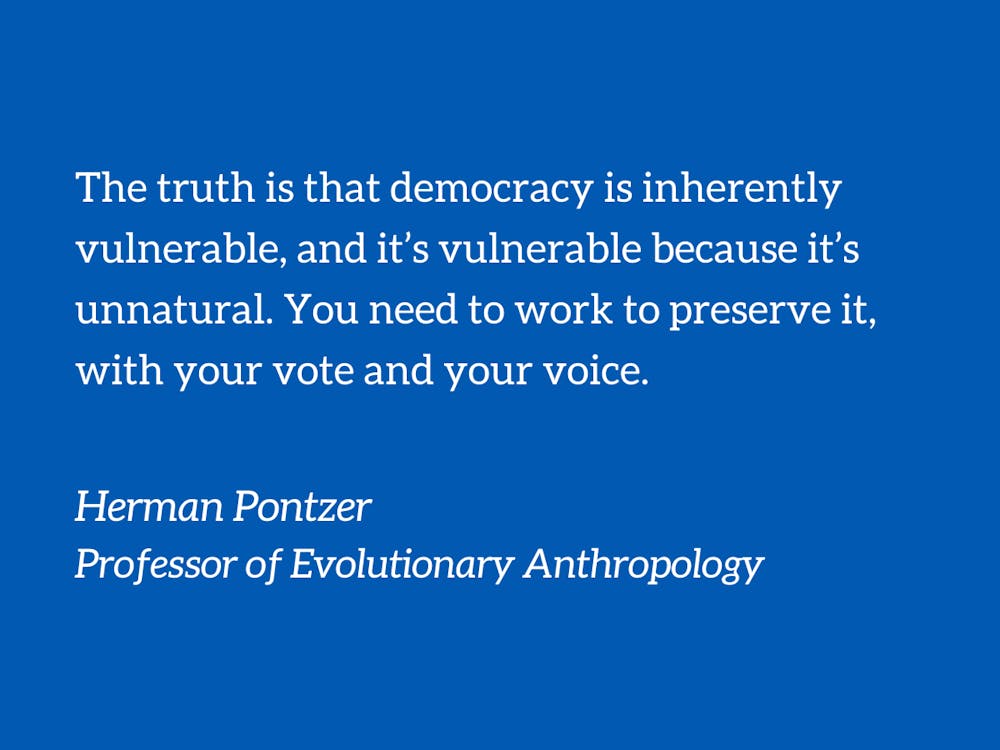If you grew up in the U.S. like I did, you can be forgiven for thinking democracy is part of the natural order. Voting starts early and lurks everywhere, from picking a name for the class goldfish to choosing our favorite TV show contestant. Puzzling, then, how democracies around the world, from Turkey to Venezuela, and yes even here, seem to be struggling. The truth is that democracy is inherently vulnerable, and it’s vulnerable because it’s unnatural. You need to work to preserve it, with your vote and your voice.
As a researcher at the intersection of human evolution and public health, I see it all the time. We’re a hunting and gathering species in a Ben and Jerry’s world, our technological and cultural progress carrying unintended consequences. It’s an old problem. The advent of farming some 10,000 years ago brought more food and larger families, but average height dropped, brought low by increased population density and infectious disease.
The population growth that followed farming affected our politics as well. Hunting and gathering camps typically number between five and thirty adults, enabling face-to-face discussion and public deliberation, and important community decisions are reached through consensus. Those strategies don’t easily scale up to meet the needs of hundreds or thousands of people. As foraging gave way to farming and populations grew, consensus became untenable as a political system. Instead, authority was held by those with power, either physical or economic. Over the past 10,000 years, the vast majority of people lived under some form of dictatorship. Billions still do today.
In a handful of societies, like the Athenians and the Iroquois, people hit upon a different solution, one that took power away from dictators and recaptured the community-centered decision making of forager consensus building. Democracy gave power back to the people and encouraged public discussion. Majority rule isn’t quite the same as consensus, but it offers something similar: group decisions favored by the people and a political system that isn’t rigged to benefit the powerful few. Like soap, public sanitation and the other tools that finally turned the tide against infectious disease, democracy provided a powerful antidote to authoritarianism.
Democracy, like germ theory, is still a young idea. The United States was an early adopter in what became a global revolution, the growth of democracy around the world paralleling our own country’s long march toward full inclusion and representation. In 1788, when our Constitution was ratified, democracy was rare among nations and voting in the U.S. was available only to white men who owned land. By 1965, when the Voting Rights Act was passed to ensure all men and women could vote, roughly half of all countries around the world had some form of elected government. As democracy grew globally, more and more people were empowered to fight for labor laws, race and gender equity, LGBTQ rights, public education, social safety nets and other public investments that made life better for everyone, not just the elites.
But just like public health and hygiene, democracy needs to be learned and practiced anew by each generation. It doesn’t come naturally. Polarizing campaigns, personal attacks, filling out a ballot alone — none of it feels like the community-focused consensus building we’re built for. Representative democracies, like ours in the U.S., often lack the immediate connection to group decisions found in direct democracy. And like public health, successful democracy is boring and imperfect. The changes we want are slow in coming, and we take the victories of yesterday for granted. Like washing your hands, finishing your antibiotic, or getting vaccinated, it’s easy to think your individual actions don’t matter.
Yet it’s never been more important to do our part to preserve and promote democracy. Since 2016, the number of people worldwide living in a democracy has fallen by 1.6 billion. In the U.S., an antidemocratic movement has worked to amplify our natural ambivalence to modern politics, casting doubt on our elections, gerrymandering districts to disempower voters and placing hurdles between you and your ballot. Like the ever-evolving viruses and bacteria that never truly go away, the dictators of old have mutated, adapting to the modern electoral ecosystem to hold onto power.
To keep the dictators at bay, we need to adapt as well. The dual crises of 2020 — COVID-19 and the assault on our election — were vivid reminders of how fragile the foundations of our society can be. It’s up to each of us to lend our effort and energy to the essential project of democracy. Let’s lean into our instincts, talking with our friends and neighbors to motivate our communities. We can put the most modern of innovations, social media, to work on the ancient art of consensus building. Check with your friends, virtual and IRL, to make sure everyone is registered and ready to get to the polls.
Most of all, each of us needs to vote. We can’t let the obstacles and excuses rob us of our voice. For all that has changed since the Paleolithic, the fundamentals of group decision-making have remained the same. Whether we build consensus around the warm glow of a campfire or an iPhone, when each of us participates, we win.
Herman Pontzer is a Professor of Evolutionary Anthropology and Global Health. This piece is part of the “Virtues of Democracy” column, a series of op-eds by faculty and student contributors across Trinity College and the Sanford School of Public Policy. The column typically runs on Tuesdays or Thursdays.
Get The Chronicle straight to your inbox
Sign up for our weekly newsletter. Cancel at any time.

